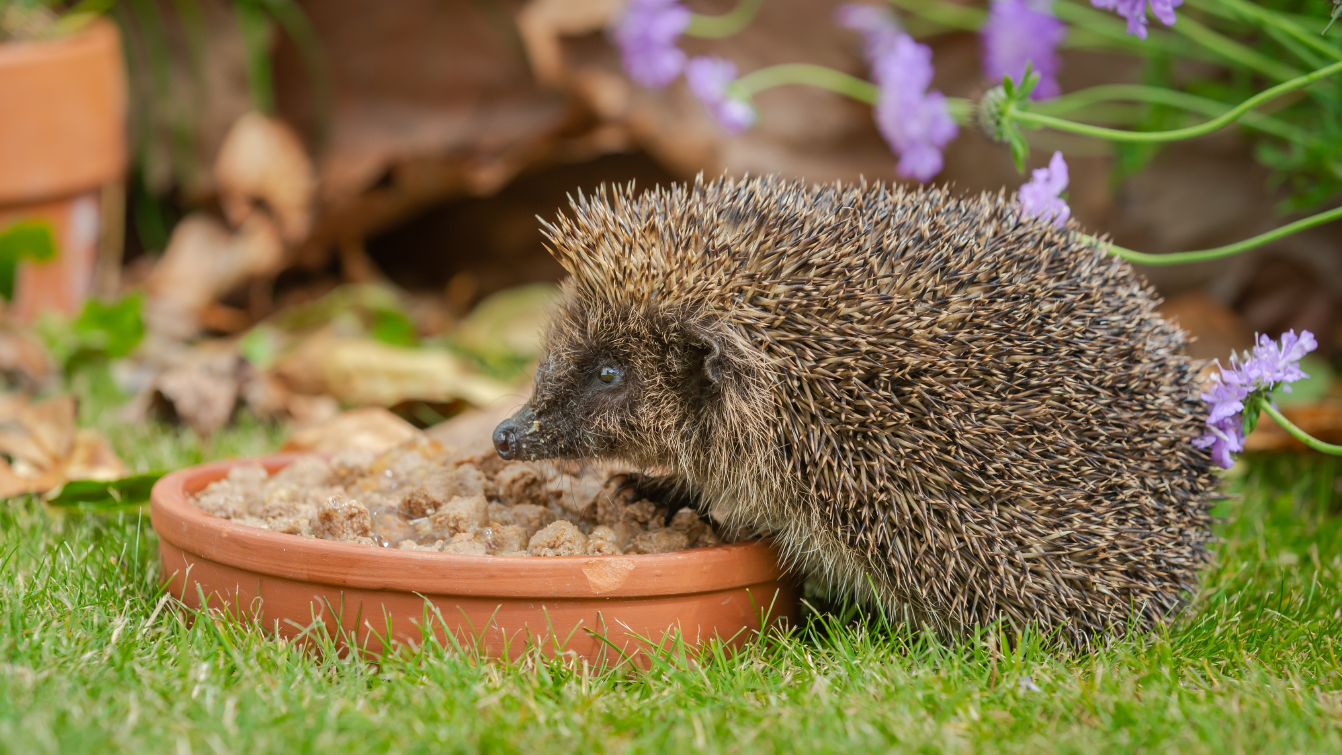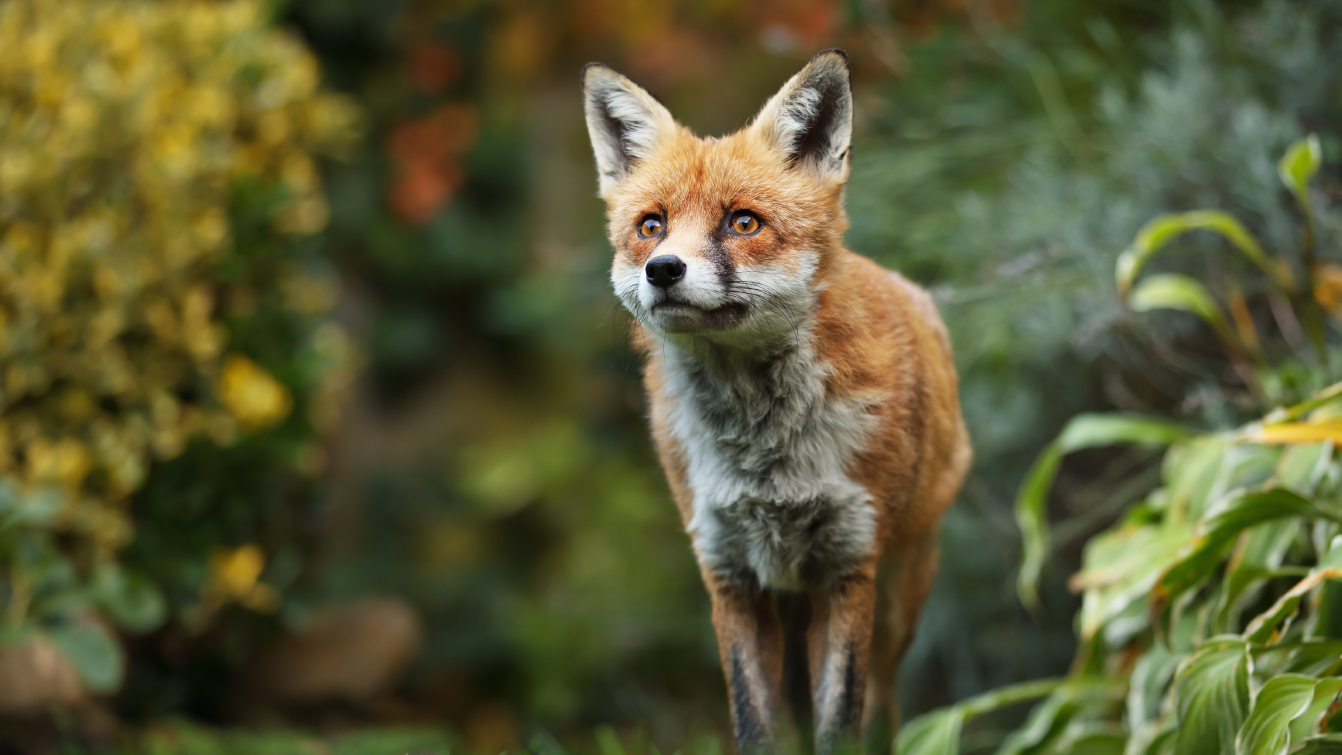26th April 2024
Since there are so many special species we want to protect here in the UK, it can be hard to know where to begin when offering food for them.
Here’s our handy guide for what to feed UK wildlife…
Remember: Don’t put out any food that might be toxic to your dog or cat.
Birds
Feeding wild birds in the summer helps them overcome the challenges they face when the ground is dry, yet also helps in winter when they struggle to find food. Here are some safe options if you want to feed wild birds:
- Sunflower seeds.
- Millet seeds.
- Nyjer seeds.
- Apples.
- Pears.
- Cooked pasta.
- Boiled potatoes.
- Mild, grated cheese.
- Dried mealworms (soak in water before feeding during spring and summer).
- Crumbled, soaked bread (large pieces can be a choking hazard and mouldy bread is harmful to birds, so don’t leave it out for too long in hot weather).
Top tip: If you have a cat, or there are cats in your neighbourhood, please ensure any bird feeders are placed at a height, so birds don’t become prey!
Hedgehogs
These special, spiny mammals are a welcome sight in UK gardens – especially since hedgehog numbers have fallen between 30% and 50% in the last two decades. If you’ve noticed hedgehogs visiting your garden, you could offer them:
- Plain kitten biscuits.
- Crushed cat biscuits.
- Meat-based wet cat food.
- Meat-based wet dog food.
Protect the food you’re leaving out for hedgehogs from being eaten by other animals, like cats, by creating your own hedgehog feeding station.
Remember: Hedgehogs are lactose intolerant, so they should never be offered milk – water is always the best option for safe hedgehog hydration.

Foxes
More and more foxes are choosing urban environments to call home, thanks to the abundance of food readily available with minimal effort. The following foods are safe to feed your fox friends:
- Boneless cooked meat.
- Raw meat.
- Meat-based wet cat food.
- Meat-based wet dog food.
- Cheese.
- Cooked vegetables.
- Fruit.
Remember: Enjoy garden fox visitors from a safe distance. We recommend feeding foxes at irregular days and times, to avoid them becoming too tame. Encouraging foxes to come too close to human activity or our beloved pets can cause them to encounter potentially dangerous situations, or make them unpopular with your human neighbours.

Badgers
Should you ever spot one of these shy creatures in your garden, count yourself lucky!
However, owing to the damage they can do to gardens, badgers might not be popular with all your human neighbours. If you do want to feed badgers, it’s worth letting your neighbours know before going ahead, and taking note of their concerns.
Here are some badger-friendly foods you could offer whenever the ground is too dry for them to find enough food (e.g. earthworms):
- Cat biscuits.
- Meat-based wet cat food.
- Meat-based wet dog food.
- Apples.
- Pears.
- Plums.
Don’t forget to wash your hands after putting food out for wildlife and cleaning their feeding stations!
Red squirrels
Thanks to their enchanting appearance, red squirrels wouldn’t be out of place in fairytales!
If you live in Scotland, Ireland, North Wales, Isle of Wight, Brownsea Island, Isles of Scilly, Cumbria, Dorset, Northumberland or the Lake District, there’s a chance you’ll encounter red squirrels. Here are a few snacks these beautiful squirrels might appreciate when their usual food sources are difficult to find:
- Sunflower seeds.
- Pine nuts.
- Hazelnuts (in their shells).
- Coconut.
- Apples.
- Carrots.
- Cuttlefish bone (for calcium – which is especially important in the summer).
Grey squirrels
While the grey squirrel may not be everyone’s favourite garden visitor, they still need nourishment, too. In case you’d like to support your neighbourhood squirrel throughout the year, they enjoy eating:
- Chopped apples.
- Carrots.
- Green beans.
- Celery.
- Dried banana pieces.
- Pumpkin seeds.
Stay up to date with our ‘Tails’ of UK Wildlife campaign, by following us on Facebook and Instagram!
Animal welfare blog
If you found this blog useful, why not visit our animal welfare blog to find more articles about animal at risk around the world?
From news and facts, to charities helping protect animals and the great work they do - find out more about animal welfare and those making a difference.
Charities we support
Every year we donate hundreds of thousands of pounds to charities - find out more about the charities we support.
We know pets
Our pets are part of the family. To achieve our vision of a better future for pets everywhere, we work with our partners, vets, and other veterinary professionals who are pioneering the latest advancements in animal care. Our campaigns, articles, and events are crafted to support, educate, and celebrate pet owners, while our policies are designed to provide peace of mind at an affordable price.
Yet our policies don’t just protect against the unexpected – they have purpose, too.
Since we were founded over 25 years ago, we've provided industry-leading policies that protect the nation’s pets, while also making a difference to animal welfare and our planet. Thanks to you, our policyholders, we've donated over £9 million to more than 830 animal welfare charities and conservancies, helping to support vulnerable pets and wildlife around the world.
We’re proud to be wildly different. Are you?
